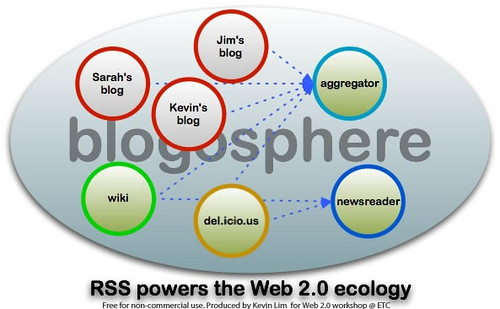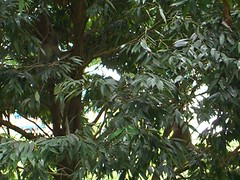There are two types of Internet users, those that use RSS and those that don't. This video is for the people who could save time using RSS, but don't know where to start.
DISCLAIMER: This blog serves as a teaching and demonstration tool. It is NOT affliated or endorsed by any organisation.
May 15, 2007
"RSS in Plain English" from The Common Craft Show
Thanks to Library Stuff which pointed me to this video on "RSS in Plain English" by the folks at The Common Craft Show:
March 03, 2007
RSI interview: Minister for Foreign Affairs, Mr George Yeo
Minister George Yeo (who guest-blogs at Beyond.SG and at Ephraim's) explains what led him to try out blogging -- read this interview transcript from the Radio Singapore International webpage:
See also: Mr. George Yeo's reflections on his BlogTV.sg interview (Jan '07).
You’ve recently said that you had to learn new tricks. What were some of these new tricks you had to learn?
Language is different. There is a certain casual informality about blogs, which makes it easy to read and makes it acceptable in the medium. If you’re too stuffy or officious, I think it’s a turnoff...
...If you’re too professional, then people get bored, they feel that it’s not appropriate. Sometimes it’s better for the pictures to be a little grainy, they look informal, more sincere more spontaneous.
There is a voyeur side to everybody; if it’s a picture that’s perfect then it’s intended for me to look at, but if it’s grainy it’s almost as if I’m peering over somebody’s shoulder and overhearing a conversation, which is a different experience.
So these are aspects of communication which I’m understanding a bit better now.
See also: Mr. George Yeo's reflections on his BlogTV.sg interview (Jan '07).
February 13, 2007
Web 2.0. - Digital Ethography
November 12, 2006
Blog learning resource: 10 tips for a great blog
Here's a very nice and concise presentation (PDF) on how to blog well:
10 Ways to a Killer Blog - Getting noticed in the new word-of-mouth network
by Robert and Maryam Scoble, PodTech.net
I also recommend that you read this book for more detailed explanation of the concepts covered in the above presentation:

Publisher: Wiley
ISBN: 047174719X
10 Ways to a Killer Blog - Getting noticed in the new word-of-mouth network
by Robert and Maryam Scoble, PodTech.net
I also recommend that you read this book for more detailed explanation of the concepts covered in the above presentation:

Publisher: Wiley
ISBN: 047174719X
November 04, 2006
Creating blogs with Blogger.com
[First posted at RamblingLibrarian]
UPDATE - See New Blogger Features (Dec 2006) + updated post (26 May 2008).
Due to repeated requests for the screenshots in creating blogs with Blogger.com, I've gotten over my procrastination and posted them in the blog. Yeah, I should've done it earlier... well, better late than never. The steps and screens are correct as of 1st Nov 2006 (once Blogger.com cuts over to the new Blogger Beta version, the features and interface might have changed).
Click on the images for the larger-sized screen-shots:
Step 1 - Blogger - Login/ Create Blog
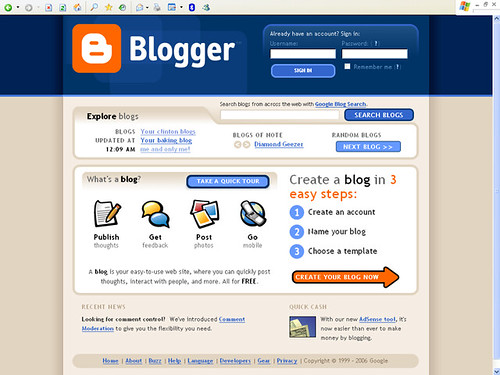
This is where you you create a blog, or login to your Blogger account - Blogger.com (additional notes in Flickr.com - click here)
Blogger - Step 1 in Creating An Account
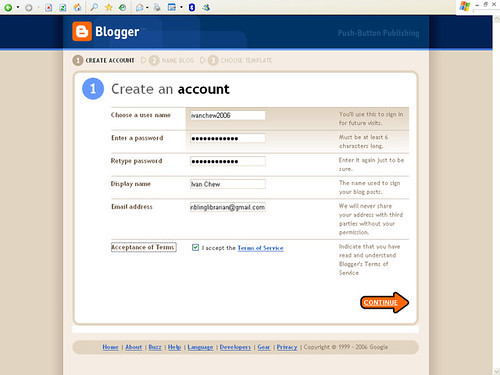
You are required to choose a User Name for your blogger account. Blogger uses Image Verification rather than Email Verification in accepting accounts. The email you enter is for things like "password reminder" rather than for creating an account with Blogger. If your preferred User Name has been taken, you'd be required to enter an alternative. Your User Name does not necessarily have to be your Blog Name or Display Name (i.e. you may wish to choose something totally unrelated to your blog name for additional security).
Blogger - Step 2: Name your blog
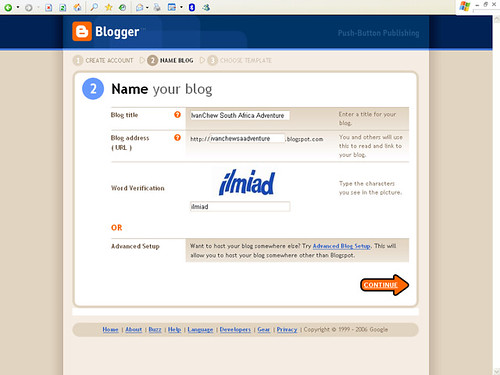
Here, you're required to enter a Title for your blog and the blog URL (these can be changed later; for the URL it will be subject to availability, so it's best to choose wisely at this stage). The Word Verification is a feature for blogger to ensure it's a human being that's creating an account, rather than an automatic program (spambot).
Blogger - Step 3: Choose a template
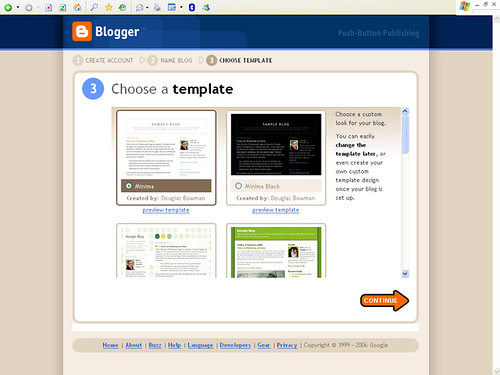
Click on any of the design. Tip -- you can always choose a new template, so simply choose anyone to proceed and complete your registration/ blog creation process. My observation is that most "Blogger newbies" spend way too much time at this stage, and adds unnecessary delay in registering the blog.
Blogger - After Step 3
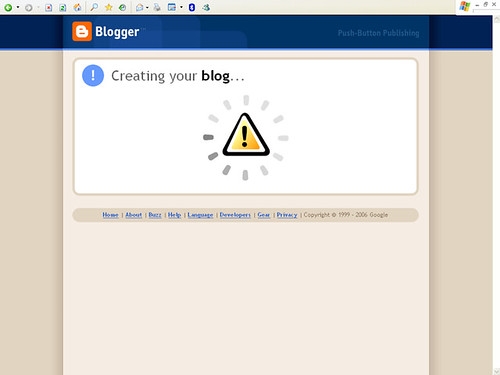
You're almost there...
Blogger - Confirmation of new blog
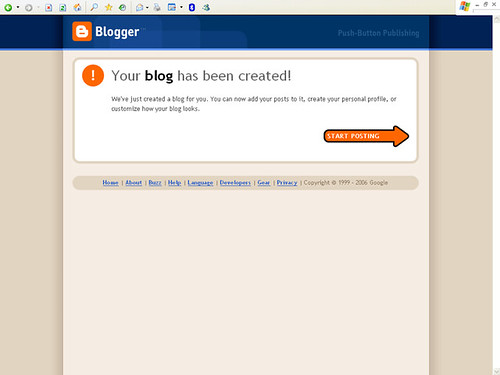
Congratulations! You now have a blog. But you if you try to visit your blog URL, you'll get a 404 Page Not Found message. Don't worry -- you see your blog once you publish at least one post. Which is why blogger will bring you directly to...
Blogger - Create/ Publish Post
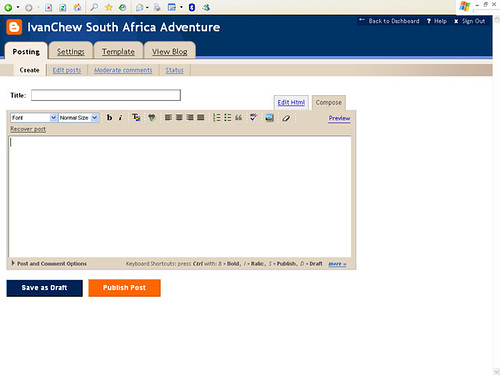
This is where you create a new post. It's almost like composing and sending an email. More explanatory notes are at the Flickr.com image - click here)
Technorati Tags: blogger, blog tutorial
UPDATE - See New Blogger Features (Dec 2006) + updated post (26 May 2008).
Due to repeated requests for the screenshots in creating blogs with Blogger.com, I've gotten over my procrastination and posted them in the blog. Yeah, I should've done it earlier... well, better late than never. The steps and screens are correct as of 1st Nov 2006 (once Blogger.com cuts over to the new Blogger Beta version, the features and interface might have changed).
Click on the images for the larger-sized screen-shots:
Step 1 - Blogger - Login/ Create Blog

This is where you you create a blog, or login to your Blogger account - Blogger.com (additional notes in Flickr.com - click here)
Blogger - Step 1 in Creating An Account

You are required to choose a User Name for your blogger account. Blogger uses Image Verification rather than Email Verification in accepting accounts. The email you enter is for things like "password reminder" rather than for creating an account with Blogger. If your preferred User Name has been taken, you'd be required to enter an alternative. Your User Name does not necessarily have to be your Blog Name or Display Name (i.e. you may wish to choose something totally unrelated to your blog name for additional security).
Blogger - Step 2: Name your blog

Here, you're required to enter a Title for your blog and the blog URL (these can be changed later; for the URL it will be subject to availability, so it's best to choose wisely at this stage). The Word Verification is a feature for blogger to ensure it's a human being that's creating an account, rather than an automatic program (spambot).
Blogger - Step 3: Choose a template

Click on any of the design. Tip -- you can always choose a new template, so simply choose anyone to proceed and complete your registration/ blog creation process. My observation is that most "Blogger newbies" spend way too much time at this stage, and adds unnecessary delay in registering the blog.
Blogger - After Step 3

You're almost there...
Blogger - Confirmation of new blog

Congratulations! You now have a blog. But you if you try to visit your blog URL, you'll get a 404 Page Not Found message. Don't worry -- you see your blog once you publish at least one post. Which is why blogger will bring you directly to...
Blogger - Create/ Publish Post

This is where you create a new post. It's almost like composing and sending an email. More explanatory notes are at the Flickr.com image - click here)
Technorati Tags: blogger, blog tutorial
July 22, 2006
Links & References for LAS Blog course, Jul/ Aug 2006 (Part 2)
[This post continues from Part 1. It will be updated up till the 2nd run of the LAS blog course on 4th Aug '06]
Selected introductory readings:
Selected Library Associations with blogs:
Singapore Library Blogs (for public access)
Librarianship-related collaborative blogs (initiated in Singapore)
Selected introductory readings:
- Soliciting for ideas on how the Library can reach out to people who find it physically inconvenient to get to the library (via High Browse Online)
- Ebay will use tagging to help it get organized (via Library Journal Blog - LJ Tech Blog)
- The Power of Blogs - (Another LJ blog article, with a few related topics in the post. As you read the post, reflect upon the tone and writing style of the post, i.e. similarities/ differences to the print version of Library Journal. Of particular interest is the post's mention about cashless payment in libraries, i.e. did you find that useful? Would something like that be published in the typical print journal?)
- Portrait of a Blogger: Under 30 and Sociable - WashingtonPost.com article commenting on a survey by the Pew Internet & American Life Project: "More than half of bloggers are younger than 30, and a majority use their blogs as a mode of creative expression, the survey found. Money-making possibilities motivate only 15 percent of bloggers, and most blog on a variety of topics, with 11 percent focusing on politics."
- Technorati.com screencast - Quicktime Movie on the newly unveiled (Jul 2006) Technorati website. Includes an overview of the features and services.
- Laptops give hope to homeless (Wired News) - How blogs are used by the homeless to reach out and express themselves (via Blogger Buzz)
Selected Library Associations with blogs:
- Australian Library and Information Association (ALIA) Blog [note: The funny thing is that they don't seem to have RSS feed, no permalinks, no comment feature... more of a website if you ask me]
- School Library Association UK
- Special Library Association - Sub Sahara Africa Chapter
- Cincinnati Law Library Blog
- Public Library Association (US) blog
- List of predominently US-centric library associations' blogs - via BlogWithoutALibrary Wiki
[This space is reserved for Library Association of Singapore]Singapore Libraries Bulletin Blog (Library Association of Singapore)
Singapore Library Blogs (for public access)
- High Browse Online (book blog, Public Library Services)
- ASK! (Advisory & Enquiry blog, Public Library Services)
- Programmes @ 100 Victoria (Programmes blog, National Library)
- Digi.Talk (e-resources blog from Digital Library Services, NLB)
- Readers' Choice (book blog, Ngee Ann Polytechnic Library)
[This space is reserved for Library Association of Singapore]Singapore Libraries Bulletin Blog (Library Association of Singapore)
Librarianship-related collaborative blogs (initiated in Singapore)
- Singapore Librarians for Empowerment & Advocacy for the Disabled - sgLEAD
- Asian Libraries - (a collaborative blog for practising librarians from Asia)
July 19, 2006
July 18, 2006
Links & References for LAS Blog course, Jul/ Aug 2006
References for blog course for LAS: "Blogs, Tagging, RSS, Podcasts: Heresay, Hype, and Hogwash?" Jul/ Aug, 2006.
[NOTE: Part 2 continues here]
On blogs and stuff
- 10 points on Blogs & RSS
- Starting a new blog
- Using Bloglines (via Preetam)
- Using Flickr (via Preetam)
- Using Technorati Tags (via Preetam)
- Using PubSub (via Preetam)
Who's Blogging? (just a sample, mind you)
- Cherian George's Air-conditioned Nation
- Cherian George's Singapore: New Media, Politics & the Law
- Lawrence Lessig (Founder & Chairman of Creative Commons)
- Lam Chun See's Good Morning Yesterday (probably Singapore's oldest blogger!)
- Tan Tarn How (policy researcher with IPS)
- Matt Cutts (google employee)
* Librarians (see Liblogarians links in next section)
Selected links to blogs/ sites with feeds
- Audio feeds
- ASK! Blog (NLB's public library services Advisory & Enquiry weblog)
- Authors/ Publishers Blog
- AustralianBlogs + Australian Podcasts + News2.0
- BookBlogs
- Blog Timeline.SG ("A timeline of significant events in the Singapore blogosphere")
- Education
- Internet Archive
- Instructables
- Los Angeles Police Department (LAPD Blog)
- LibrariesInteract ("Blog central for libraries in Australia")
- Liblogarians - Singapore
- Liblogarians - USA
- Liblogarians - UK
- Liblogarians - Australia
- Law Blogs
- Library - HKUL
- Library - NYPL
- Library - NLB
- Library News/ Research
- Singapore Heritage feeds
- Tomorrow.sg
- Yesterday.sg
- Yahoo! Search Blog
(To view all my Bloglines Subscriptions, click here)
EXERCISES:
1) Inserting images for blog posts
Here are sample HTML codes. Copy and paste the codes to your blog post and see how they turn out (remember to replace the "*" portions with "<" and ">" respectively):
2) Group Activity - writing blog posts
- Try writing a blog post individually.
- Next try working together in groups of 2 or 3
- Consider a theme/ topic
[NOTE: Part 2 continues here]
On blogs and stuff
- 10 points on Blogs & RSS
- Starting a new blog
- Using Bloglines (via Preetam)
- Using Flickr (via Preetam)
- Using Technorati Tags (via Preetam)
- Using PubSub (via Preetam)
Who's Blogging? (just a sample, mind you)
- Cherian George's Air-conditioned Nation
- Cherian George's Singapore: New Media, Politics & the Law
- Lawrence Lessig (Founder & Chairman of Creative Commons)
- Lam Chun See's Good Morning Yesterday (probably Singapore's oldest blogger!)
- Tan Tarn How (policy researcher with IPS)
- Matt Cutts (google employee)
* Librarians (see Liblogarians links in next section)
Selected links to blogs/ sites with feeds
- Audio feeds
- ASK! Blog (NLB's public library services Advisory & Enquiry weblog)
- Authors/ Publishers Blog
- AustralianBlogs + Australian Podcasts + News2.0
- BookBlogs
- Blog Timeline.SG ("A timeline of significant events in the Singapore blogosphere")
- Education
- Internet Archive
- Instructables
- Los Angeles Police Department (LAPD Blog)
- LibrariesInteract ("Blog central for libraries in Australia")
- Liblogarians - Singapore
- Liblogarians - USA
- Liblogarians - UK
- Liblogarians - Australia
- Law Blogs
- Library - HKUL
- Library - NYPL
- Library - NLB
- Library News/ Research
- Singapore Heritage feeds
- Tomorrow.sg
- Yesterday.sg
- Yahoo! Search Blog
(To view all my Bloglines Subscriptions, click here)
EXERCISES:
1) Inserting images for blog posts
Here are sample HTML codes. Copy and paste the codes to your blog post and see how they turn out (remember to replace the "*" portions with "<" and ">" respectively):
*a href="http://www.flickr.com/photos/ramblinglibrarian/153598467" title="Photo Sharing"**img src="http://static.flickr.com/55/153598467_8fbb8d369c.jpg" width="375" height="500" alt="Singapore Short Stories"**/a*
*a href="http://www.flickr.com/photos/ramblinglibrarian/138240722/" **img src="http://static.flickr.com/53/138240722_375dcffdb4_m.jpg" width="240" height="222" alt="Macro_Orchid 0406"**/a*
*a href="http://www.flickr.com/photos/ramblinglibrarian/131272959/"**img src="http://static.flickr.com/50/131272959_a5ab2f3210.jpg" width="375" height="500" alt="Mushroom 190406"**/a*
*a href="http://www.flickr.com/photos/ramblinglibrarian/131915800/"**img src="http://static.flickr.com/56/131915800_be07f06f81.jpg" width="500" height="374" alt="Oven Fresh Cookies - Macro"**/a*
*a href="http://www.flickr.com/photos/ramblinglibrarian/138240721/"**img src="http://static.flickr.com/52/138240721_eaaf32f7ba.jpg" width="355" height="500" alt="Macro_Gloxinia"**/a*
2) Group Activity - writing blog posts
- Try writing a blog post individually.
- Next try working together in groups of 2 or 3
- Consider a theme/ topic
Labels:
blogging,
podcasts,
resource list,
web 2.0.,
workshop
Course for Library Association of Singapore: An introduction to Blogs and related technologies, and its applications in Libraries
As posted at the Library Association of Singapore calendar page:
Source: las.org.sg/calendar.htm#BLOGS (last accessed 18 Jul 06)
Title:
Blogs, Tagging, RSS, Podcasts: Heresay, Hype, and Hogwash?
An introduction to Blogs and related technologies, and its applications in libraries
Conducted by : Mr Ivan Chew
Ivan holds a BSc (Econs) & a MSc. (Information Studies). His current job is to develop and manage the Adults & Young People's (AYP) services, working with a team of AYP librarians to look into collection, programmes and services in the public libraries. At last count, he has five blogs.
Date/Time:
19 Jul 06, 2pm - 5pm (update: Additional run scheduled for 4 Aug 06)
Venue:
NLB Academy
Carnegie Room
Toa Payoh Community Library
Level 3, 6 Toa Payoh Central
Singapore 319191
Course Fees:
LAS Member: $50.00
Non-LAS Members : $60.00
Class size : 10 (min) - 24 (max)
Closing date : 12 Jul 2006
Outline of course:
1. "Blogs" in the Singapore context
2. Define & understand "blogging" terminologies
3. Examples of blogs in education and libraries
4. How does one create a blog? (Hands-on)
5. Introduction to blog-related resources for content creation and searching (RSS, flickr.com, podcasting, tagging/ folksonomy/ technorati.com, blog search engines etc)
6. Discussion of possible applications, legal and ethical issues in the context of libraries
You will have a hands-on experience on blogging.
How you will benefit
After attending the course, the participants will:
- have an overview of blogging
- understand more about RSS, podcasting
- learn how to use these new technologies to better serve your library users
Target Audience
All information services professionals with backgrounds in libraries
Source: las.org.sg/calendar.htm#BLOGS (last accessed 18 Jul 06)
July 17, 2006
MICA Innovation Fiesta 2006 - Basics of Podcasting Workshop
UPDATE - 18 Jul 06. Here's a podcast from one of the participant from the course: Mr. Philip Lim shares a story on a Customer Service encounter:
powered by ODEO
Links featured in the course:
1) Definition of Podcasting
- Ask A Ninja: Special Delivery 1 "What is Podcasting?"
- Definition from Wikipedia
- Definition from EatFeed.com
- TODAYonline ("What's all the podding fuss about?")
2) Selected podcasts
- Mr. Brown Show
- EatFeed.com
- BBC Radio (Step by Step guide to getting a podcast)
- Daily Breakfast with Fr. Roderick
- Health Promotion Board, Singapore
- Penguin Podcast
- Kevin Lim (on Flu wiki)
3) Other sites & links
- Planning your podcast recording session (Apple iLife GarageBand tutorial)
- Audacity (Open source audio-recording/ editing software)
- Studio.odeo.com (free podcasting hosting)
- Archive.Org (hosting of audio files, but no dedicated feed for the file)
- RamblingLibrarian podcast
**************************
[Original post]
I've been roped in to plan and conduct a podcasting workshop for the MICA Innovation Fiesta 2006.
See, Do, Hear: Knowing the Basics of PodCasting
18 July 2006
2.30pm – 5.00pm
Possibility Room, Level 5
National Library Board
100 Victoria Street
Singapore 188064
Listen to the spoken Introduction:
powered by ODEO
The Script:
Tag: podcasting
powered by ODEO
Links featured in the course:
1) Definition of Podcasting
- Ask A Ninja: Special Delivery 1 "What is Podcasting?"
- Definition from Wikipedia
- Definition from EatFeed.com
- TODAYonline ("What's all the podding fuss about?")
2) Selected podcasts
- Mr. Brown Show
- EatFeed.com
- BBC Radio (Step by Step guide to getting a podcast)
- Daily Breakfast with Fr. Roderick
- Health Promotion Board, Singapore
- Penguin Podcast
- Kevin Lim (on Flu wiki)
3) Other sites & links
- Planning your podcast recording session (Apple iLife GarageBand tutorial)
- Audacity (Open source audio-recording/ editing software)
- Studio.odeo.com (free podcasting hosting)
- Archive.Org (hosting of audio files, but no dedicated feed for the file)
- RamblingLibrarian podcast
**************************
[Original post]
I've been roped in to plan and conduct a podcasting workshop for the MICA Innovation Fiesta 2006.
See, Do, Hear: Knowing the Basics of PodCasting
18 July 2006
2.30pm – 5.00pm
Possibility Room, Level 5
National Library Board
100 Victoria Street
Singapore 188064
Listen to the spoken Introduction:
powered by ODEO
The Script:
Hello.
Welcome to the MICA Innovation Fiesta 2006 workshop titled "See, Do, Hear: Knowing the Basics of Podcasting".
You are now listening to a podcast. What better way to start a podcasting workshop by using a podcast, right?
My name is Ivan Chew. I'm with the National Library Board Singapore (NLB). In my 10 years with NLB, I've been assigned various roles: I've worked as a librarian at a community library; I've been involved in digital & web-based projects. I've managed a few libraries & was part of a team in upgrading one. Now I work with a team of librarians delivering Adult & Young Peoples' Services across our network of public libraries.
But what makes me qualified to conduct this workshop on podcasting? Well, in my personal capacity I have five blogs and one podcast (feed). I am not an expert on podcasting but rest assured I have enough to share for an introductory workshop. Besides, one point we're making here is that you don't have to be an "expert" to produce a podcast.
By the end of our three hour session, you'll be able to do or understand at least three things: One, explain to others what are podcasts. Two, know how to listen to podcasts. And three, understand how they are produced & the ways in which they can be delivered.
We will also discuss possible applications of podcasts. During the workshop we will be listening to a few selected ones. Basically, you'll see podcasting from both the consumer's and the producer's perspective.
Now here's the fun part -- we have a group activity to produce (or attempt to produce) a podcast episode. It sounds challenging but anyway, this IS the Innovation Fiesta afterall.
So let's innovate. Let's play!
Tag: podcasting
July 12, 2006
Intro to Blogs workshop, by Kevin Lim (Feb 06)
Kevin (theory.isthereason.com) posts his workshop content, including links to his presentation slides and PDF handouts. Summary of the outline posted in his blog:
- INTRODUCTION
- EXAMPLES OF SCHOLARLY BLOGS
- THE SOFT-SIDE OF BLOGGING
- THE HARD-SIDE OF BLOGGING
- WHAT IS RSS AND HOW TO SUBSCRIBE TO THEM?
- SIGNING UP WITH BLOGGER.COM
- GETTING STARTED WITH BLOGGING
- RELATED REFERENCES
Read his full post here.
Technorati Tags: Blog Workshop, Blog Course
- INTRODUCTION
- EXAMPLES OF SCHOLARLY BLOGS
- THE SOFT-SIDE OF BLOGGING
- THE HARD-SIDE OF BLOGGING
- WHAT IS RSS AND HOW TO SUBSCRIBE TO THEM?
- SIGNING UP WITH BLOGGER.COM
- GETTING STARTED WITH BLOGGING
- RELATED REFERENCES
Read his full post here.
Technorati Tags: Blog Workshop, Blog Course
February 15, 2006
SAOUG Blog Course Practice: "Would South African Librarians embrace blogging?"
Question: Would South African Librarians embrace blogging? What is the level of readiness?
Comments & responses please.
Comments & responses please.
February 11, 2006
Schedule: SAOUG - Blogging 101 for Dummies workshop (13 Feb - 17 Feb 2006)
Participants will learn what a blog is, learn how to create blogs, name their blogs, how to post comments, change the template of the blog, and how to delete their blog (in fact everything you wish to know about blogs). It will be a practical hands-on workshop.
-----------------------------------------------------------
SCHEDULE (Mon, 13 Feb - Fri 17, Feb 2006)
-----------------------------------------------------------
Monday, 13 Feb
Venue Medical Library, University of Pretoria
Session 1: 8:00-12:00
Session 2: 13:00-17:00
Tuesday, 14 Feb
Venue Dynamix Training Centre, Witkoppen Road, Sunninghill
Session 1: 8:00-12:00
Session 2: 13:00-17:00
Wednesday, 15 Feb
Venue Dynamix Training Centre, Witkoppen Road, Sunninghill
Session 1: 8:00-12:00
Session 2: 13:00-17:00
Thursday, 16 Feb
Venue University of Johannesburg, Kingsway Campus
Session 1: 9:00-13:00
[Depart in afternoon from Johannesburg International to Cape Town for session in Cape Town, then back to Johannesburg the next day]
SCHEDULE (Mon, 13 Feb - Fri 17, Feb 2006)
-----------------------------------------------------------
Monday, 13 Feb
Venue Medical Library, University of Pretoria
Session 1: 8:00-12:00
Session 2: 13:00-17:00
Tuesday, 14 Feb
Venue Dynamix Training Centre, Witkoppen Road, Sunninghill
Session 1: 8:00-12:00
Session 2: 13:00-17:00
Wednesday, 15 Feb
Venue Dynamix Training Centre, Witkoppen Road, Sunninghill
Session 1: 8:00-12:00
Session 2: 13:00-17:00
Thursday, 16 Feb
Venue University of Johannesburg, Kingsway Campus
Session 1: 9:00-13:00
[Depart in afternoon from Johannesburg International to Cape Town for session in Cape Town, then back to Johannesburg the next day]
Time 3:55 PM - Depart JNB for CPT on British Airways.
Arrive 6:05 PM
Arrive 6:05 PM
Friday, 17 Feb
Venue University of Stellenbosch
Session 1: 9:00-13:00
[Depart in evening from Cape Town for Johannesburg]
Time 6:45 PM - Depart CPT for JNB on British Airways
Arrive 8:55 PM
Saturday, 18 Feb
Depart for Singapore.
Related post - Blogging in South Africa (SAOUG Blog Course, Part 1)
Tag: SAOUG
February 10, 2006
January 08, 2006
Example of using blogs to share a more "human side" of ourselves to colleagues
This was an early post of mine, about my dog. In blogging something as personal and mundane as the name of my dog, I was trying to show how blogging could be used as a tool for social networking and expanding the readers' learning capacity (by introducing them to books in the library collection). Effectively, what I did was to link keywords in my blog post to catalogue entries in the library OPAC.
I also discovered that people who googled for "schnauzer" also visited my blog. From the comments (like this one), my colleagues and I were able to share and discuss something that we normally wouldn't have an opportunity to talk about in a work-setting:
Click on this Technorati Tag (Schnauzer) to read similar posts "tagged" by other bloggers (think of "tags" as Subject Headings to link related posts).
I also discovered that people who googled for "schnauzer" also visited my blog. From the comments (like this one), my colleagues and I were able to share and discuss something that we normally wouldn't have an opportunity to talk about in a work-setting:
Max, the Mini Schnauzer: Blogs as tools for Social Networking and Expanding Learning Capacity
While thinking of a name for our dog, my wife and I surprisingly came up with the same name, but for different reasons. I was thinking of Maximus, the Gladiator [NLBLink 7821448/ NLBLink 10127342] played by Russell Crowe. My wife too, came up with the name, Max. But she was really thinking about main character in the cartoon series "The Transformers" [NLBLink 11795414], Optimus Prime, except that she mistakenly thought the heroic robot was called "Maximus Prime".
Click on this Technorati Tag (Schnauzer) to read similar posts "tagged" by other bloggers (think of "tags" as Subject Headings to link related posts).
Example of using blogs to express opinions that otherwise might not be heard
[I'm using personal examples as I blog about them. If you discover similar ones, feel free to leave them as comments]
In this example, I came across two articles where I felt was grossly inaccurate. While the originating site allowed feedback to be submitted, I wasn't sure if they would publish my comments so my blog allowed me to post my views and share with others. You can also see from the post how others post their reactions in my blog, thus giving a more balanced picture to the original post.
I also deliberately chose to use the same article title for my blog post, so that when someone googles it, my blog post might be picked up with the originating articles:
Personally, I think expressing one's opinions & reactions in one's own blog is a more mature position to take, as opposed to flaming someone in their articles or posts. :)
In this example, I came across two articles where I felt was grossly inaccurate. While the originating site allowed feedback to be submitted, I wasn't sure if they would publish my comments so my blog allowed me to post my views and share with others. You can also see from the post how others post their reactions in my blog, thus giving a more balanced picture to the original post.
I also deliberately chose to use the same article title for my blog post, so that when someone googles it, my blog post might be picked up with the originating articles:
Brave New Singapore?
Learnt from Loy's blog (From a Singapore Angle, 7 Jan 06) about a two-part series commenting on "the lack of liberty in Singapore" ...
Personally, I think expressing one's opinions & reactions in one's own blog is a more mature position to take, as opposed to flaming someone in their articles or posts. :)
January 04, 2006
Example of information sharing & exchange: Bad experience with fridge
Here's a personal example of how consumers can use blogs to voice their frustration/ opinions over certain products or services:
This was a real example that happened to me and my wife -- our fridge went kaput and we had a series of negative experiences as a result. I decided to blog about it because the frustration was very real.
How would blogging about it help?
Well the fridge didn't recover by itself. I doubt if Ariston will replace my fridge for free just because I blogged about it. But it sure helped me ease some sense of frustration, and I'm certainly sharing information to people who care to read it. Sure it's full of bias and presents only my side of the story. But that's what "word of mouth" is about, isn't it?
If Ariston had employees who know how to seek out blogs that mention it's products and services, then they might be able to do something about it. They might even want to contact me to try and convert me back to a customer.
And consider this -- if you, the consumer, was considering buying a fridge, would you consider buying the same model that I had? What thoughts went through you as you read the post?
Ariston Fridges
So I'm frustrated from the entire chain of events. Could Ariston have prevented it? I don't know. Maybe a better hinge design. Maybe some Ariston employee will do a Google or Technorati and find my blog piece. Maybe they will do something about the design.
But they sure won't hear it from me direct via their formal feedback channel (if any). Why should I when I'm not going to try my luck with another Ariston fridge again, no matter how good it looks.
This was a real example that happened to me and my wife -- our fridge went kaput and we had a series of negative experiences as a result. I decided to blog about it because the frustration was very real.
How would blogging about it help?
Well the fridge didn't recover by itself. I doubt if Ariston will replace my fridge for free just because I blogged about it. But it sure helped me ease some sense of frustration, and I'm certainly sharing information to people who care to read it. Sure it's full of bias and presents only my side of the story. But that's what "word of mouth" is about, isn't it?
If Ariston had employees who know how to seek out blogs that mention it's products and services, then they might be able to do something about it. They might even want to contact me to try and convert me back to a customer.
And consider this -- if you, the consumer, was considering buying a fridge, would you consider buying the same model that I had? What thoughts went through you as you read the post?
January 02, 2006
Example of information sharing & exchange: Pair of monkeys
Here's one personal example of using blogs and online tools like Flickr.com for information exchange and sharing among individuals:
How's this useful?
Pair of monkeys spotted at Yishun Park
My wife and I visited Yishun Park today and we spotted a pair of wild monkeys in a tree. I happened to have my digital camera along and snapped a few pictures...
[click on image to see more]
How's this useful?
- For one, I don't have to email the pictures to my friend that I had in mind. He subscribes to my blog (though I dropped him an email just in case).
- He might pass the word around to other people in nature groups, and they could add comments to my blog post (it might turn out to be 'public education' of sorts)
- If we wanted to, we could use tools like Technorati Tags and adopt a common tag when blogging about the same topic.
September 01, 2005
Books on blogging
Here's a link to a list of blogging-related books available from the NLB. If anyone wishes to recommend additional books or resources, feel free to post a comment here.
Sept 1 session (afternoon): Main discussion points
We modified our approach a little bit for the afternoon session, based on a quick review of this morning's session before we went for lunch.
For the afternoon session, we did pretty much the same except that we conducted the demo a little slower (for the hands-on blogging part).
Some participants tended to get a little mixed up over the "User Name" (when they register for blogger), the "Blog Name" for the blogspot site, as well as the "Blog Address". Not surprising, since many of them had no experience in creating their own homepages.
But Rajen and I felt that for a group that had no experience in creating personal homepages, they did very well. Everyone today (morning & afternoon's session) was able to create a blog of their own, create posts, change the template, add comments, post comments in other people's blog, delete comments and also deleting a blog.
This is a snapshot of the discussion points raised for the afternoon session:
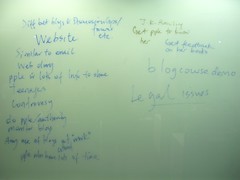
We took these down before the start of the session. We asked what came to the participant's minds when they hear about "blogs". We had responses like "it's a website", "it's similar to email", "it's a web diary", "it's put up by people with lots of info to share", "it's a teenager thing", "it's controversial".
At the end of the session, we asked them to review those same points noted earlier. One thing all agreed that it wasn't just a "teenage thing" and blogs aren't necessarily controversial.
Someone asked "do people or authorities monitor blogs". I took that question and said I don't really know. Basically, to blog is to publish. So do it responsibly.
As with the morning session, the participants were also interested in legal issues regarding blogs. The point Rajen & I tried to make was that existing laws applies -- you'd get into trouble if you make inaccurate or inappropriate statements.
We had a point noted down -- "Any use of blogs about work?" (whatever "work" might be). We discussed about corporate blogging. Mentioned about IBM blogging guidelines, and shared the example of Microsoft's Channel 9.
And just like the morning session, we showed them Bloglines as an example of a RSS newsreader.
Judging from the participants' responses & written feedback, the course seemed to have met the stated course objectives.
For the afternoon session, we did pretty much the same except that we conducted the demo a little slower (for the hands-on blogging part).
Some participants tended to get a little mixed up over the "User Name" (when they register for blogger), the "Blog Name" for the blogspot site, as well as the "Blog Address". Not surprising, since many of them had no experience in creating their own homepages.
But Rajen and I felt that for a group that had no experience in creating personal homepages, they did very well. Everyone today (morning & afternoon's session) was able to create a blog of their own, create posts, change the template, add comments, post comments in other people's blog, delete comments and also deleting a blog.
This is a snapshot of the discussion points raised for the afternoon session:

We took these down before the start of the session. We asked what came to the participant's minds when they hear about "blogs". We had responses like "it's a website", "it's similar to email", "it's a web diary", "it's put up by people with lots of info to share", "it's a teenager thing", "it's controversial".
At the end of the session, we asked them to review those same points noted earlier. One thing all agreed that it wasn't just a "teenage thing" and blogs aren't necessarily controversial.
Someone asked "do people or authorities monitor blogs". I took that question and said I don't really know. Basically, to blog is to publish. So do it responsibly.
As with the morning session, the participants were also interested in legal issues regarding blogs. The point Rajen & I tried to make was that existing laws applies -- you'd get into trouble if you make inaccurate or inappropriate statements.
We had a point noted down -- "Any use of blogs about work?" (whatever "work" might be). We discussed about corporate blogging. Mentioned about IBM blogging guidelines, and shared the example of Microsoft's Channel 9.
And just like the morning session, we showed them Bloglines as an example of a RSS newsreader.
Judging from the participants' responses & written feedback, the course seemed to have met the stated course objectives.
Subscribe to:
Comments (Atom)


